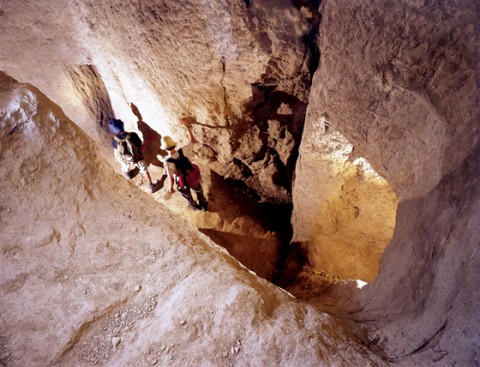Controversial dig: The politics of Israeli archaeology

In Israel, archaeology is followed with the same passion that soccer excites in other countries. That’s because archaeological findings—especially ones that reveal Jews’ ancient attachment to the land—have political meaning. As Israelis see it, such findings show that this is their land and no one can take it from them.
The problem, of course, is that another people—the Palestinians—have similar claims to the same land. Often the two sets of claims clash. The conflict sharpened after 1967 when Israel captured the whole of the West Bank, including East Jerusalem, and the Israeli government passed a law uniting the city of Jerusalem—an act that the international community does not recognize as legal. At the same time, Israel made the Temple Mount (known to Muslims as Haram el-Sharif), Judaism’s most holy site, an Arab enclave under the control of the Wakf, the Arab Religious Council.
Read our latest issue or browse back issues.
The Israelis have continued to dig all around Jerusalem, while the Palestinians have tried to stop digs that they see as infringements on their sacred territory. In the 1990s, Muslims undertook their own dig on the southeast corner of the Temple Mount as part of providing new access to the Marwani Mosque (also known as Solomon’s Stables). The dig was criticized by Israelis for taking place without the proper archaeological supervision, and some Israeli archaeologists charged that the Muslim excavators hid evidence of ancient Jewish presence at the site.
Recently, attention has been focused on a site known as the City of David, which lies just south of Jerusalem’s Old City. Archaeologists are exploring a site on and around the stream of Gihon, a site associated with the origins of the city. Jerusalem, like so many cities, was founded on or near a water source.
Nowadays this area is a tourist site run by the private Jewish organization Elad, which leads visitors through a complex of tunnels and cavernous spaces that show how the ancients created a water system that allowed them to live on the not very large hill that is the center of Jerusalem.
The people who were responsible for the original structure were probably Canaanites, specifically the people known in the Bible as Jebusites. According to 2 Samuel 5, David took the city from the Jebusites (around 1000 BCE) and turned the city into his capital.
David’s son Solomon expanded the site to include a garden —still bearing fruit today—at the base of the hill, which was perhaps the inspiration for much of the sensual imagery in the Song of Songs. Next to this site is a recently discovered stairway that once led to the Second Temple. The stairs, built in the era of Herod, are some 600 meters long and were the main way by which Israelites climbed to the temple.
Halfway up the ridge is a site dug by British archaeologist Kathleen Kenyon from 1960 to 1967. It possibly contains the “Millo” or earthen platform mentioned in the biblical description of David’s capture of the city (2 Samuel 5; 1 Kings 9). Kenyon uncovered and partially reconstructed a massive wall that stands overlooking the Kidron Valley.
At the top of the hill directly beneath the southern walls of the Old City is a site being excavated by the Israeli archaeologist Eilat Mazar. She claims that this is the site of King David’s fortified palace. Other scholars dispute that claim, saying that the ruins stem from an older period, probably from that of the Jebusites.
“I’m not saying conclusively that this is David’s fortress or palace,” says Mazar. “But until anyone brings proof that it isn’t, I’m sticking to my theory.”
“As for pottery,” says Mazar, “that is a disputable way of deciding the age of a site. What we have found in the site could be [dated] ten or 20 years one way or the other. So dating the site as David’s is certainly in the realm of the possible.”
Other structures from the biblical period thought to be in the area are the defensive walls built by Hezekiah or his son Menashe (2 Kings 23 and 24) to protect the water sources; Hezekiah’s Tunnel, which was dug into the side of the ridge to defend the city against the Assyrian King Sennaharib (in 702 BCE); and the so-called Jeremiah’s Pit, which is unlikely to be the exact pit where the prophet Jeremiah was placed but which no doubt resembles it in its gloomy atmosphere.
The archaeological questions have large political dimensions. Sitting above these archaeological sites of the City of David are the homes of Palestinian Arabs, some of whom have been living there since before the creation of the State of Israel in 1948. Many resemble shantytown dwellings; some have been sold to Israelis.
The area around the city walls has been declared a national park under management of the Nature and Parks Authority. Toward the top of the hill is a visitors center created by Elad, whose name means “God is eternal” in Hebrew and is also an acronym in Hebrew for “Toward the City of David.”
Elad has only tenuous connections with the NPA, and its role in operating the tourist site has been legally challenged. Elad, like the Shalem Institute, which also supports the City of David project, is financed by private donors, many of them from the U.S.
Neither Elad nor Shalem hides its nationalistic Israeli agenda of celebrating Jewish origins on the site. For many Israelis, the city belongs to the Jewish people since David took it over some 3,000 years ago. That it fell into foreign hands is merely one of the twists of history, as they see it. To counteract the narrative presented by Elad, the Palestinian community has opened its alternative interpretation center.
Whom does the City of David belong to? Does it belong to the State of Israel or to the many private homeowners? Is its maintenance the role of the municipality of Jerusalem, the Nature and Parks Authority, the Israel Antiquities Authority (IAA), the Ministry of Tourism, the Hebrew University—or, as seems to be the case recently, does it belong to Elad, which has taken over the day-to-day running of the area as well as the funding of the archaeological digs carried out by the IAA? The IAA opposed Elad’s activity in 1997 but in 2002 decided to allow it.
The private funding of digs is not unusual—most archaeological digs throughout the world have been funded by private monies. But this Israeli choice is politically significant. By delegating responsibility for the City of David to Elad, the NPA, the municipality of Jerusalem and ultimately the government of Israel have freed themselves from the responsibility of overseeing the site.
It is clear that Elad wishes to Judaize the city as much as possible. It pays Palestinian homeowners good money to sell their homes. I heard a story from a former Elad guide who said that one Palestinian agreed to sell on condition that it would be made to seem as if he were forced to sell—otherwise he was afraid he would be targeted by Palestinians. I can’t corroborate the story, but it indicates how contested the area is.
The Palestinians living in Wadi Hilwa/Silwan, the East Jerusalem neighborhood around the City of David, say that their proposal for development in the area and their effort to get a part in the tourism industry were rejected by Jerusalem officials. One result was that the Palestinians left the municipal committee overseeing the area.
An organization of left-wing Israeli archaeologists called Emek Shaveh is opposed to what Elad is doing. It sees Jerusalem as a multicultural city which must acknowledge the historical interests of Jews, Christians and Muslims.
“What all sides must come to realize,” said Yonathan Mizrachi, head of Emek Shaveh, “is that Jerusalem is for everybody. No one owns her. . . . She has to be shared.”
Neither Palestinians nor Israelis speak with one voice on the excavations. Countless committees have been formed with different causes. The topic is so politically sensitive for the Israeli government that it employs a sort of doubletalk on the subject. For example, in a recent article on the unauthorized Temple Mount/Haram el-Sharif digs by Muslims, a spokesperson from the prime minister’s office was quoted as saying that a report on the dig was published but not released—and that failure was attributed not to the government but to “a subcommittee of the committee on foreign relations and security.”
Clearly, political calculation figures into every archaeological decision in Jerusalem, despite the assertion of Elie Wiesel, the Nobel Prize–winning author, that Jerusalem “has to be above politics.” As it happens, Wiesel is chair of Elad’s advisory board.






